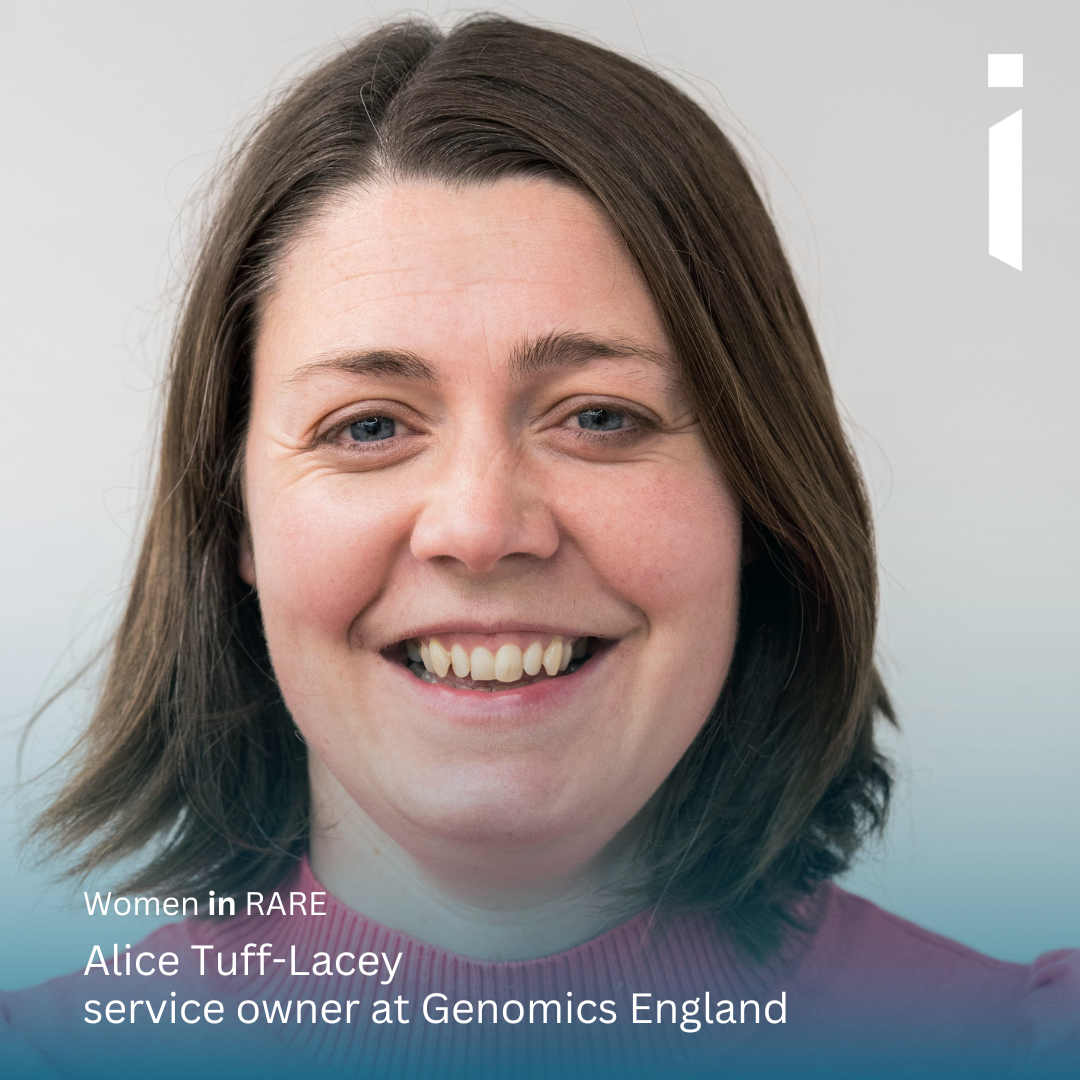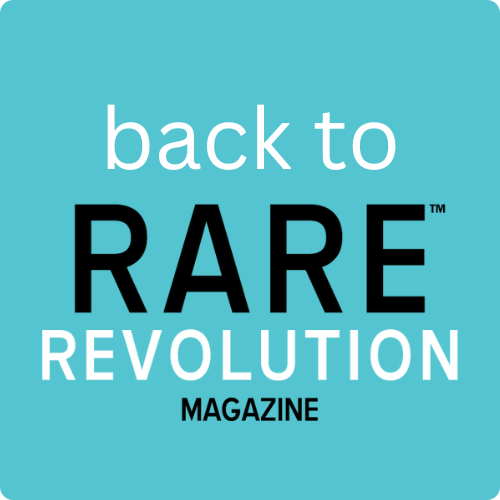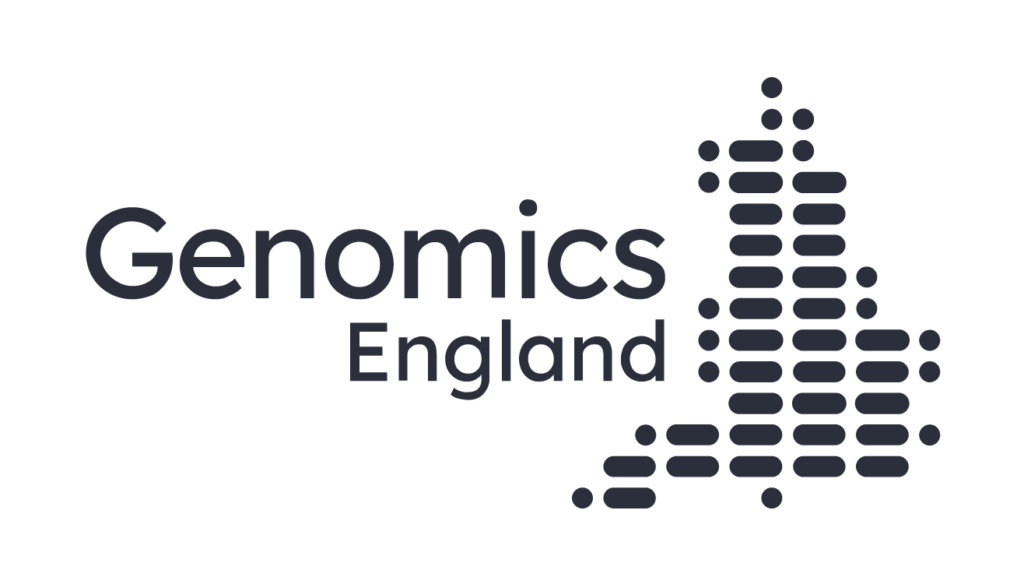Alice Tuff-Lacey of Genomics England
Estimated reading time: 6 minutes

“What I love about the roles I have done is they sit at the junction between research and care with an opportunity to drive innovation. At the same time, they have a direct connection between the work and families, and people at the end of it trying to make their lives better.”
After completing a science degree, my first role was at a small charity promoting good evidence in public debates. I then moved to Cancer Research UK in 2010 to set up and manage a project demonstrating how you could do multiple genetic tests at the same time for a reasonable cost and turnaround time. It feels unbelievable now, but at that time genetic testing within cancer was a new area and whole genome sequencing was considered far off. But in 2015 I moved to Genomics England where I worked on the 100,000 Genomes Project looking at the use of whole genome sequencing for cancer and rare diagnosis and the subsequently commissioned Genomic Medicine Service. These experiences led me to my current role leading the design and delivery of a national study into using whole genome sequencing to screen for rare conditions in 100,000 newborn babies—the Generation Study.
What motivated you into your chosen career path?
When I finished university, I knew I did not want to do scientific research, but I wanted to find a job that would allow me to still be involved in science. My first job was a fantastic opportunity to do that whilst having an immediate positive impact on people’s lives. I realised how many of these types of roles exist and my ability to make things happen led me to a role in project management. At that time my mother passed away after a long battle with cancer and so I started looking into the cancer and charity space to see what roles existed there. What I love about the roles I have done since then is they sit at the junction between research and care with an opportunity to drive innovation. At the same time, they have a direct connection between the work and families, and people at the end of it trying to make their lives better.
What do you see as some of the opportunities as a woman in your field?
Our generation benefits from there being such a diverse range of roles and disciplines available to us. You can move between areas by transferring skills. In my case I did this by moving from science communications and engagement to project managing health innovation projects. This also means you can take time to understand what you enjoy and where you can bring value without being stuck in a particular career. It can also make it easier to make decisions about where you live and if you decide to have a family. I particularly see this in my work as I have a hugely multidisciplinary team which involves people from ethics, design, clinical, engagement, delivery, engineering backgrounds and many of them are woman. By their nature complex innovation programmes like the Generation Study requires that breadth of expertise and diverse backgrounds. I also think it is exciting that you can create change through science without having to do the science yourself.
What are some of the barriers to success as a woman in your field?
I have three daughters and finding the balance between my family and my career can been tricky and sometimes it feels like you are always doing worse at one aspect. I did make some conscious decisions to be part-time for a period when my children were younger which meant I did not seek out opportunities to progress. However, I read an article at that time which has always resonated with me. This suggested seeing your career as a joint venture between yourself and your partner and working out when the best times are to follow opportunities and when to have a slightly more stable position. At that time, it made sense for our family for me to be part-time and in a less intensive role as my husband was growing and running his own company. As that stabilised, I was then able to move into my current role which has been intensive but hugely rewarding both personally and professionally. It helps that he is also incredibly supportive and we work as a team.
I am also very passionate about supporting people returning to work after parental leave given how much you change during that time. It can be really challenging to regain your confidence and understand how your personal changes have altered how you approach things in a work environment. The more supported people are, the easier that transition becomes.
What is one piece of advice you would give your 10-year-old self?
To worry less about failing and be willing to take risks sometimes.
It took me a long time to realise that it’s ok to make mistakes and that by failing I learn how to be better, and no decision is worse than a decision that may not go as well as you expect.
Can you tell us about your current work priorities and focus or a particular project you are working on?
I currently lead the Generation Study which is a national study looking at how we can use whole genome sequencing to screen for rare conditions in newborn babies. Many rare conditions are treatable, but we know that the time for diagnosis can take on average five years for families. Whole genome sequencing has helped improve that diagnostic odyssey, but we want to understand if we can use whole genome sequencing in newborns to identify treatable rare conditions quickly so we can improve the life of those children. It’s important we run this as a study though, so we can understand both the feasibility, benefits and potential harm of this approach. At the end of the study, we hope to provide the evidence for the NHS to decide if this should be a national clinical service offered to all families.
The study also asks parents for consent to keep the babies’ genomic data and link it to health information over time. Approved researchers can then access this data without knowing the babies’ identities. This will allow us to evaluate the study over time to understand and enable further research questions to be asked of the data. This could significantly advance our understanding of how to diagnose and treat rare conditions more effectively.
We’ve worked very closely with parents and the rare disease community during the design and implementation of the study. This is to make sure we have the experience of the parents at the centre of designing how participants are recruited to the study and how we return the results about their babies’ health. The study is now live and recruiting in 27 hospitals across England with over 3500 results returned to parents, including a small number where we have found a potential rare condition. Our goal is sequencing the whole genomes of 100,000 babies by 2027.
Connect with Alice
Women in RARE is a celebration of women working in the RARE space in science, research, industry and advocacy. To access more Women in RARE articles click below.


